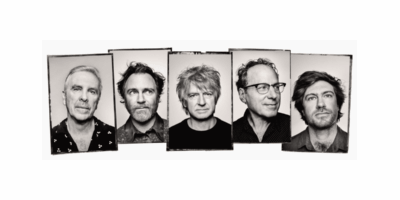25 years ago, Alanis Morissette changed the face of commercial rock music with her global best-seller Jagged Little Pill.
Although it was Morissette’s third album, Jagged Little Pill was the first to be released outside of her home country of Canada. The singer’s previous two albums – 1991’s Alanis and 1992’s Now is the Time – were recorded when she was still a teenager and centred on accessible dance pop and lyrical innocence.
But for Jagged Little Pill, the 21-year-old Morissette made a sharp left turn into the world alternative rock and pop rock; electric guitars and emotionally raw vocal performances. The record came loaded with a surfeit of chart-topping singles, including the likes of ‘You Oughta Know’, ‘Hand in My Pocket’ and ‘Ironic’.
Listeners will instantly recognise these songs, but stick the album on again and you’ll find yourself automatically singing along with the remainder of its 12-song track listing. Pretty much every song could’ve been a single. In fact, half of them were – songs like ‘Head Over Feet’, ‘You Learn’ and ‘All I Really Want’ kept Morissette at the centre of radio playlists for more than 18 months after JLP’s release.
‘Ironic’ and ‘Head Over Feet’ were both certified Gold in Australia, while ‘You Oughta Know’ went one better, achieving ARIA platinum certification and placing at #20 on ARIA’s best selling singles of 1995.
Check out ‘You Learn’ by Alanis Morissette:

Given the timing of JLP‘s release – i.e. one year after Kurt Cobain’s death – some awkward genre signifiers get attached to the record – namely, terms like “grunge-pop” or “post-grunge”. It’s true that what defines Jagged Little Pill is the same as that which defines Nevermind. But it’s not some wobbly adherence to the tenets of grunge; it’s the songwriting. Melody is in rich supply across Jagged Little Pill, which allows the record to stand capably on its own two feet to this day.
Love Music?
Get your daily dose of metal, rock, indie, pop, and everything else in between.
Countless musicians have cited the influence of Jagged Little Pill. The Guardian spoke to a handful of Morissette disciples in celebration of the record’s 20th anniversary in 2015. “She was this woman playing electric guitar, really wailing and not trying to be sexy,” said The Staves’ Emily Staveley-Taylor. “Her lyrics had real integrity; she’s singing about stuff that really matters and there are real stories in there.”
Molly Rankin of Canadian indie pop act Alvvays was similarly moved. “Learning Celtic music and only hearing a narrow selection of male singer-songwriters, Alanis was an alien,” she said. “Every word, yodel and yarble was memorised and mimicked.” English musician Shura underlined the record’s feminist legacy. “It was exciting to see a woman rock out – that there was more than just the Spice Girls,” she said.
Morissette’s feminism isn’t merely implicit, either. She’s been an eloquent speaker on the topic in recent years. In a 2016 Time op-ed she described the patriarchy as “an ignorant and emotionally immature purgatory at best, and, at worst, a liminal despair-filled holding pattern carefully held together by resistance, hate, hostility and separatism.”
Check out ‘Head Over Feet’ by Alanis Morissette:

But the appeal of Jagged Little Pill isn’t restricted to its feminist import. Morissette is the focus of a scene in Steve Coogan and Rob Brydon’s 2014 quasi-documentary The Trip to Italy. “Avril Lavigne, in many ways, is the young person’s Alanis Morissette,” says Brydon. But Coogan’s having none of it. “I don’t want to do down a young performer, but [Avril’s] no Alanis Morissette,” he says. “Alanis Morissette is an authentic voice.”
The two comedians then crank Jagged Little Pill through the car stereo and unpack the lyrics of opening track, ‘All I Really Want’. “Do I stress you out? My sweater is on backwards and inside out,” sings Alanis. “I admire you taking a stand against society’s mores by wearing your jumper inside out,” jokes Brydon. “But enough is enough.”
But after some sarcastic skewering, Coogan still can’t deny the album’s enduring strengths. “Do you know what? It is music that appeals to neurotic teenage girls, but it’s actually rather good.”
25 years on from its release, certain aspects of Glen Ballard’s production will grate, particularly for first-time listeners. You get the impression they wanted to approximate the sound of a hard-working rock band. Accordingly, the guitars are doused in loads of distortion, but they often sound like they’re coming from a tightly sealed room four blocks away from the rest of the band. The drum sounds are tinny and half the tracks include drum programming.
But the strength of the songwriting sustains and so too does Morissette’s vocal delivery. Her lyrics have been subjected to extensive ridicule over the years. We get it – rain on your wedding day and black flies in your chardonnay are examples of bad luck, not irony. But everything’s presented with a heck of a lot of heart, which preserves the record’s integrity a quarter of a century down the line.
Check out ‘Ironic’ by Alanis Morissette:



































